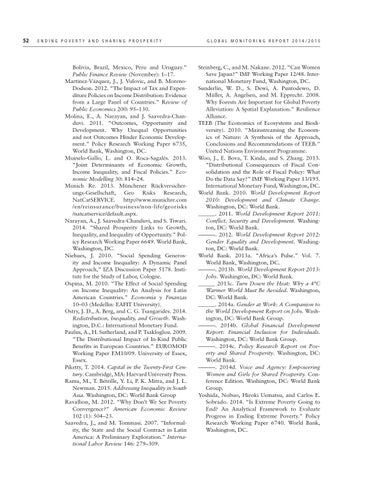52
ENDING POVERTY AND SHARING PROSPERITY
Bolivia, Brazil, Mexico, Peru and Uruguay.” Public Finance Review (November): 1–17. Martínez-Vázquez, J., J. Vulovic, and B. MorenoDodson. 2012. “The Impact of Tax and Expenditure Policies on Income Distribution: Evidence from a Large Panel of Countries.” Review of Public Economics 200: 95–130. Molina, E., A. Narayan, and J. Saavedra-Chanduvi. 2011. “Outcomes, Opportunity and Development. Why Unequal Opportunities and not Outcomes Hinder Economic Development.” Policy Research Working Paper 6735, World Bank, Washington, DC. Muinelo-Gallo, L. and O. Roca-Sagalés. 2013. “Joint Determinants of Economic Growth, Income Inequality, and Fiscal Policies.” Economic Modelling 30: 814–24. Munich Re. 2013. Münchener Rückversicherungs-Gesellschaft, Geo Risks Research, NatCatSERVICE. http://www.munichre.com /en/reinsurance/business/non-life/georisks /natcatservice/default.aspx. Narayan, A., J. Saavedra-Chanduvi, and S. Tiwari. 2014. “Shared Prosperity Links to Growth, Inequality, and Inequality of Opportunity.” Policy Research Working Paper 6649. World Bank, Washington, DC. Niehues, J. 2010. “Social Spending Generosity and Income Inequality: A Dynamic Panel Approach,” IZA Discussion Paper 5178. Institute for the Study of Labor, Cologne. Ospina, M. 2010. “The Effect of Social Spending on Income Inequality: An Analysis for Latin American Countries.” Economia y Finanzas 10–03 (Medellin: EAFIT University). Ostry, J. D., A. Berg, and C. G. Tsangarides. 2014. Redistribution, Inequality, and Growth. Washington, D.C.: International Monetary Fund. Paulus, A., H. Sutherland, and P. Tsakloglou. 2009. “The Distributional Impact of In-Kind Public Benefits in European Countries.” EUROMOD Working Paper EM10/09. University of Essex, Essex. Piketty, T. 2014. Capital in the Twenty-First Century. Cambridge, MA: Harvard University Press. Rama, M., T. Béteille, Y. Li, P. K. Mitra, and J. L. Newman. 2015. Addressing Inequality in South Asia. Washington, DC: World Bank Group Ravallion, M. 2012. “Why Don’t We See Poverty Convergence?” American Economic Review 102 (1): 504–23. Saavedra, J., and M. Tommasi. 2007. “Informality, the State and the Social Contract in Latin America: A Preliminary Exploration.” International Labor Review 146: 279–309.
GLOBAL MONITORING REPORT 2014/2015
Steinberg, C., and M. Nakane. 2012. “Can Women Save Japan?” IMF Working Paper 12/48. International Monetary Fund, Washington, DC. Sunderlin, W. D., S. Dewi, A. Puntodewo, D. Müller, A. Angelsen, and M. Epprecht. 2008. Why Forests Are Important for Global Poverty Alleviation: A Spatial Explanation.” Resilience Alliance. TEEB (The Economics of Ecosystems and Biodiversity). 2010. “Mainstreaming the Economics of Nature: A Synthesis of the Approach, Conclusions and Recommendations of TEEB.” United Nations Environment Programme. Woo, J., E. Bova, T. Kinda, and S. Zhang. 2013. “Distributional Consequences of Fiscal Consolidation and the Role of Fiscal Policy: What Do the Data Say?” IMF Working Paper 13/195. International Monetary Fund, Washington, DC. World Bank. 2010. World Development Report 2010: Development and Climate Change. Washington, DC: World Bank. ______. 2011. World Development Report 2011: Conflict, Security and Development. Washington, DC: World Bank. ———. 2012. World Development Report 2012: Gender Equality and Development. Washington, DC: World Bank. World Bank. 2013a. “Africa’s Pulse.” Vol. 7. World Bank, Washington, DC. ———. 2013b. World Development Report 2013: Jobs. Washington, DC: World Bank. ______ 2013c. Turn Down the Heat: Why a 4°C Warmer World Must Be Avoided. Washington, DC: World Bank. ______. 2014a. Gender at Work: A Companion to the World Development Report on Jobs. Washington, DC: World Bank Group. ———. 2014b. Global Financial Development Report: Financial Inclusion for Individuals. Washington, DC: World Bank Group. ———. 2014c. Policy Research Report on Poverty and Shared Prosperity. Washington, DC: World Bank. ———. 2014d. Voice and Agency: Empowering Women and Girls for Shared Prosperity. Conference Edition. Washington, DC: World Bank Group. Yoshida, Nobuo, Hiroki Uematsu, and Carlos E. Sobrado. 2014. “Is Extreme Poverty Going to End? An Analytical Framework to Evaluate Progress in Ending Extreme Poverty.” Policy Research Working Paper 6740. World Bank, Washington, DC.
